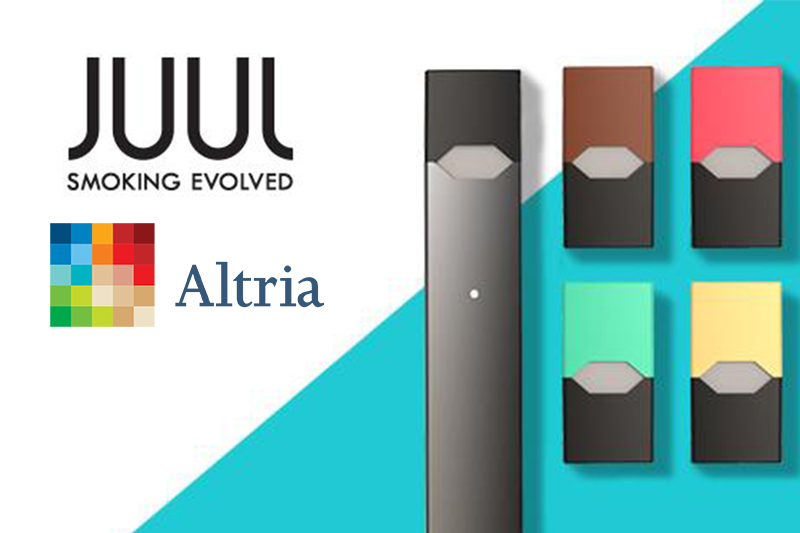The world of vaping is a complex one, intertwined with big business and shifting consumer habits. You might be curious about who’s backing these companies, especially given the health concerns surrounding vaping. It’s a valid question, and the answer reveals a significant power play in the tobacco and vaping industries. So, let’s dive into which tobacco giant made a major investment in Juul, and what that means for the future of vaping.
The Tobacco Company’s Investment in Juul
The tobacco company that invested in Juul is Altria. This wasn’t just a small investment; it was a substantial move that reshaped the vaping landscape. Altria, the parent company of Philip Morris USA (makers of Marlboro cigarettes), made a significant bet on the future of Juul. But how big was this bet, exactly?
Details of Altria’s Juul Investment
In December 2018, Altria acquired a 35% stake in Juul Labs for a whopping $12.8 billion. Yes, you read that right – billions! This investment gave Altria a significant foothold in the rapidly growing e-cigarette market. It was a strategic move designed to diversify Altria’s portfolio as traditional cigarette sales declined. Think about it: a tobacco giant investing in a company that offers an alternative to cigarettes. Interesting, isn’t it?
Why Did Altria Invest in Juul?
The reasons behind Altria’s investment in Juul are multifaceted. It wasn’t just about jumping on the vaping bandwagon. There were deeper strategic considerations at play. Let’s explore some of the key motivations:
- Declining Cigarette Sales: Traditional cigarette sales were steadily declining, prompting Altria to seek new revenue streams;
- Growth of the E-Cigarette Market: The e-cigarette market was experiencing rapid growth, presenting a lucrative opportunity for Altria.
- Access to Juul’s Technology and Market Share: Juul had a dominant market share in the e-cigarette industry and innovative technology that Altria wanted to leverage.
- Diversification: Altria aimed to diversify its portfolio and reduce its reliance on traditional tobacco products.
Essentially, Altria saw Juul as a way to secure its future in a changing market. It was a calculated risk, but one that seemed promising at the time. But what happened after the investment?
What Happened After the Tobacco Company Invested in Juul?
The relationship between Altria and Juul was not without its challenges. Regulatory scrutiny, health concerns, and marketing controversies ultimately led to significant changes. It’s a story of ambition, setbacks, and a shifting landscape.
Challenges and Changes Following the Investment
Following Altria’s investment, Juul faced increasing scrutiny from regulators and public health advocates. Concerns about youth vaping and the addictive nature of e-cigarettes led to restrictions on marketing and sales. The partnership between Altria and Juul began to unravel. What were some of the key turning points?
- Regulatory Pressure: Increased scrutiny from the FDA and other regulatory bodies.
- Marketing Restrictions: Limitations on advertising and marketing practices, particularly those targeting young people.
- Health Concerns: Growing concerns about the health effects of vaping, especially among adolescents.
- Lawsuits and Settlements: Legal challenges related to Juul’s marketing practices and the addictive nature of its products.
Ultimately, Altria exited its investment in Juul, marking the end of a turbulent chapter in the history of both companies. The vaping landscape continues to evolve, with new regulations and changing consumer preferences shaping the future of the industry.
FAQ About the Tobacco Company’s Juul Investment
Did Altria completely own Juul at any point?
No, Altria never held a majority stake in Juul. Their investment was a 35% minority stake.
Why did Altria eventually sell its stake in Juul?
Altria divested from Juul due to regulatory pressures, lawsuits, and the declining value of its investment.
What is Juul’s current status?
Juul continues to operate, but faces ongoing legal and regulatory challenges. The company’s market share has significantly decreased.
The story of Altria’s investment in Juul is a cautionary tale about the complexities of the tobacco and vaping industries. It highlights the challenges of navigating a rapidly changing market, the importance of regulatory compliance, and the potential consequences of marketing practices that target young people. The vaping landscape is constantly evolving, and it will be interesting to see what the future holds; One thing is certain: the debate surrounding e-cigarettes and their impact on public health will continue for years to come. The saga of Altria and Juul serves as a reminder of the power of big business and the importance of responsible corporate behavior.





